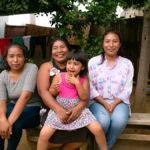GARLAND—Steven Arze works two jobs. He hopes the place where he serves as a volunteer significantly decreases traffic at the place where he makes his living. And his employer agrees wholeheartedly.

Charlotte Greenhaw from First Baptist Church in Garland provides spiritual counseling for patient Karen Pruitt at Hope Clinic in downtown Garland. (PHOTOS/Ken Camp)
|
Arze, a member of Lake Pointe Church in Rockwall, serves as medical director of Hope Clinic, a Christian health care provider for the working poor in Garland, and works as director of the emergency department at Baylor Medical Center at Garland.
“I would love to decrease my business in the emergency department,” he said.
Specifically, Arze wants to see Hope Clinic become the primary health care provider for uninsured or underinsured workers in Garland who need help managing chronic illnesses, freeing the hospital’s emergency room to focus on the mission for which its staff is trained.
“There’s a real misperception in this country that emergency departments can do everything. In reality, I know we can’t do it all. Our mission is to care for people with immediate, life-threatening illnesses and injuries,” he said.
Baylor Medical Center at Garland has developed a partnership with Hope Clinic to help the hospital emergency department and the faith-based clinic each perform its mission better. The partnership involves referrals, coordination of services and investment by Baylor in the ongoing ministry of Hope Clinic.
Jenny Williams, a registered nurse and member of Lake Pointe Church in Rockwall, serves as executive director of Hope Clinic. Previously, she worked in a similar capacity at another faith-based clinic, Mission East Dallas.
| {youtube}aJUe3L70hWA{/youtube} |
Hope Clinic offers a variety of service, including a women’s clinic, a pediatric clinic, a walk-in evening clinic and a diabetic education program. Hope Clinic serves about 70 patients a weeks—at least three-fourth of them Spanish-speaking, many of them undocumented and all of them fitting into the category of the working poor—living at 200 percent of the federal poverty line or less, Williams explained.
Sign up for our weekly edition and get all our headlines in your inbox on Thursdays
“We want to provide them a medical home where they can learn to manage long-term health conditions,” she explained. “We want to emphasize prevention and management.”
The clinic occupies two small buildings behind First United Methodist Church of Garland, which leases the property to Hope Clinic for $1 a month. The city of Garland provided a $25,000 grant to renovate one of the buildings, with labor donated by volunteers from First Baptist Church, First United Methodist Church and Lake Pointe Church-Firewheel Campus, all in Garland.
Area churches that provide ongoing support for Hope Clinic include South Garland Baptist, Mount Hebron Baptist, First Baptist and Lake Pointe.
A half-dozen physicians volunteer their services at Hope Clinic on a weekly or every-other-week basis, and another 35 serve on a rotating basis, she explained.

Scott Wang, a graduate of the family medicine residency program at Baylor Medical Center at Garland, works on staff at Hope Clinic each Monday and Wednesday. On Tuesdays and Thursdays, he works at Irving Interfaith Clinic. Both clinics are part of the HealthTexas Provider Network, a subsidiary of the Baylor Health Care System.
|
Scott Wang, a recent graduate of the Baylor family medicine residency program at Baylor Medical Center at Garland, works on staff at Hope Clinic each Monday and Wednesday from 8 a.m. to 6 p.m.
On Tuesdays and Thursdays, Wang works at Irving Interfaith Clinic. Like Hope Clinic, the Irving clinic is part of the HealthTexas Provider Network, a subsidiary of the Baylor Health Care System. The Project Access Dallas community service program provides funding for Wang’s position.
Service at the two faith-based clinics enables Wang to fulfill two objectives that initially drew him to family medicine—a desire to build relationships with patients and to provide essential services for people in need in an atmosphere where he can share his Christian faith freely.
“I am able to spend ample time with patients,” he said. “Because the clinics are Christian-based, I don’t have to be cautious about crossing boundaries by talking freely about spirituality. Even some non-Christians are open to my offer of praying for them.”

Physician Jennifer Kampas listens to the lungs of patient Florencia Cruz at Hope Clinic. Kampas volunteers regularly at the faith-based clinic in Garland.
|
Wang acknowledged his surprise at experiencing the raw emotions of people who live at society’s margins.
“They don’t have as much materially to cover up their pain. They are depleted, and the emptiness is so evident,” he said. “If you say the right thing and ask the right questions, the floodgates open.”
Chaplain Mark Grace, vice president of Baylor Health Care System’s office of mission and ministry, sees Baylor’s commitment to Hope Clinic, Irving Interfaith and other community-centered, faith-based clinics as an outgrowth of its dedication to the Christian ministry of healing.
“It’s a real commitment to the cause of Christ,” he said.
Grace, who serves as co-pastor of Iglesia Bautista Bill Harrod in West Dallas, pointed to the impact Baylor makes through the community-based clinic it helps support at Brother Bill’s Helping Hand ministry.
“I can see the people helped and see the difference that care is making in my community,” Grace said.














We seek to connect God’s story and God’s people around the world. To learn more about God’s story, click here.
Send comments and feedback to Eric Black, our editor. For comments to be published, please specify “letter to the editor.” Maximum length for publication is 300 words.